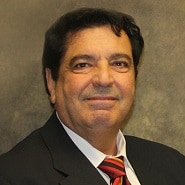
Daniel Morreale, former CIO, Hunterdon Healthcare
Rule number one: make sure you face the person.
It might surprise you to learn that approximately 48 million Americans have some degree of hearing loss. I am one of them. For me, it takes the form of not being able to process words in large, noisy rooms. I cannot distinguish between foreground and background noise; and so, at a loud meeting or party, all I hear is noise. Sometimes called the “Cocktail Party Syndrome,” it is the inability to differentiate sound from background noise.
Central Auditory Processing Disorder, as it is called, is a very common problem. How do I compensate for this? I don’t go to parties, I avoid loud gatherings (easier in the Covid-19 era) and generally nod and bob my head, pretending to understand what you are saying but really not having a clue. My family thinks it’s selective, but it is not.
In general, hearing loss has been shown to negatively impact physical, emotional, and mental health. It can inhibit social skills, relationships, and self-esteem. Individuals with hearing loss have worsened healthcare outcomes. It is not surprising, in some ways, to discover that people with hearing loss wait more than 7 years on average before seeking help, and in general, people with hearing loss don’t self-identify.
There, my friend, is the problem. For many individuals with hearing loss, a healthcare encounter is not a positive experience. With access to care becoming a perennial headline, are we doing all we can to effectively communicate with the hearing impaired?
For individuals with hearing loss, accessing care can be difficult. Sure, we provide headsets that amplify sound and think we have effective communication. We don’t! We provide American Sign Language (ASL) translators and think we have done all we can, but we haven’t! We do all the things we need to be in ADA compliance. But it falls short; it’s not effective communication in helping diagnose and treat individuals.
And we do these things only when an individual self identifies a hearing issue. And let’s remember that in a time of COVID, we are all wearing masks, thus eliminating the visual cues and lip movements helpful to understanding during conversation.
In one of the recent healthcare facilities in which I worked, I met a woman who introduced me to audio-frequency induction loops, which are an assistive listening device (ALD) used to improve hearing ability. It is more effective than an amplifying headset because it reduces the speech to noise ratio. And it does not distort the sound.
I was so impressed with the technology that we took it to the CEO and to the Board and received funding for a trial. The trial took the form of installing a “loop” system at every registration point in the hospital. We used mostly portable units but all loop technology is simple and requires only that the device be turned on, and that the non-hearing impaired individual speak into a microphone. We trained staff on how to use them, and put up signage at each location indicating there was an assistive listening device in place.
The loop systems come in many forms. In some cases they were built into the seat cushion. In one it was built into a mat on which the hearing impaired person stood. There are portable units that sit on a desk. After the pilot — which was a success — we installed loops in an auditorium, public meeting spaces, physician offices, and waiting rooms, with whole-room floor or ceiling loops.
The feedback was remarkable. My organization started to receive thank you notes from previously unknown hearing impaired patients. Our physician recognized almost immediately that communication was more effective; on the nursing units and in patient rooms, individuals were asking for a bedside loop. All in all, a successful project.
I was fortunate enough to find a NJ-based company called Audio Directions, which is a premiere provider of Loop systems. But I am sure there are companies in your city that can provide this service as well. Loops are inexpensive, easy to install, and will make a dramatic change in the way in which we manage, engage and treat patients with a hearing impairment or loss.
Dan Morreale has amassed more than 20 years in healthcare IT leadership, including CIO roles at Atlanticare, Kingsbrook Jewish Hospital, and most recently, Hunterdon Healthcare.


Share Your Thoughts
You must be logged in to post a comment.